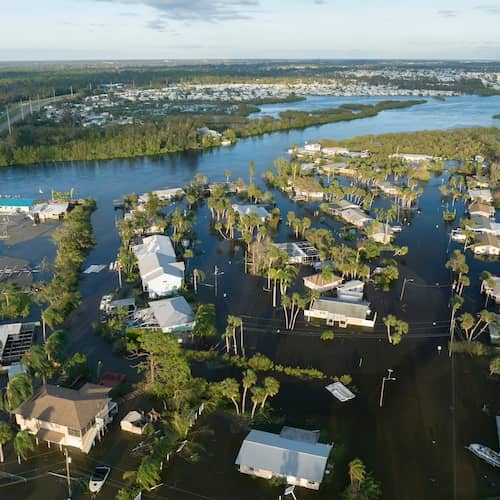Natural hazard disclosure report (NHD): What is it and what does it cover?
May 19, 2023
•5-minute read
Selling a home in California? You’re required to provide buyers with a Natural Hazard Disclosure report, better known as an NHD.
Sellers must provide this report so buyers know they’re considering a home at greater risk from major natural hazards, such as wildfires, floods or earthquakes.
The goal of an NHD report is to ensure you’re informing buyers of the known risks that come with owning your home. If you disclose to buyers that your home sits in an area prone to wildfires, you shouldn’t have to worry about potential lawsuits if a blaze destroys the house after finalizing the sale.
What is the natural hazard disclosure report?
A natural hazard zone is an area where homes face a greater risk of damage or destruction from natural disasters, such as earthquakes, floods, landslides and wildfires.
The Natural Hazard Disclosure Report is a document buyers will encounter when they buy a house in California. Under California’s 1988 Natural Hazard Disclosure Act, home sellers must provide this report to inform buyers of potential risks.
The report discloses if a home is:
- In an area prone to floods.
- Sitting on an earthquake fault line.
- In an area likely to be hit with fires and wildfires.
- At risk from a dam breach.
- In a seismic hazard zone.
An NHD often runs more than 40 pages long. In addition to major natural disasters, the report discloses whether a home is at risk for minor hazards that could make insuring the home more expensive or riskier to live in, such as buying a home in an airport influence area.
When you sell a property, your listing agent usually orders an NHD report from a third-party company before finalizing the sale or at escrow. The report typically costs home sellers $50 – $150, depending on the length.
Once buyers get the NHD report, they can review the document to help them decide what to do. If they decide to buy the house, they must sign the Natural Hazard Disclosure Statement.
Why do you need an NHD report in real estate?
An NHD report protects a seller from potential liability. It’s your opportunity to inform buyers of the risks involved in purchasing your home. If you disclose that your home is in an area prone to earthquakes or wildfires, for instance, you won’t be liable if an earthquake or wildfire destroys the home after the sale.
The report can also include information on property taxes, special assessments, homeowners insurance costs or the need to purchase additional hazard insurance to protect the home.
Purchasing your NHD report from a third party can also shield you from potential lawsuits in the future. If the NHD contains incorrect information – maybe it claims your home doesn’t sit in a floodplain when it does – the legal liability will fall on the company that prepared the report, not you.
Which states require an NHD?
California is the only state that requires an NHD report. But that doesn’t mean other states don’t require disclosures when selling a home. For instance, many states require disclosure if there is lead-based paint in a home. Other states may require disclosure if your basement regularly floods or your home has a history of termites or mold damage.
Discuss the required disclosure forms with your real estate agent. Your agent should know which disclosure forms you must provide by law.
What should be included in the NHD report?
In an NHD, homeowners disclose whether their home might be impacted by six primary hazards, checking a box for each relevant hazard that presents a risk for the California home they’re selling.
Special flood hazard area
Homeowners must indicate whether the home they’re selling is in a special flood hazard area, an area where a home is at high risk for flooding. Buyers who get an NHD report with this box checked can explore additional insurance to protect themselves financially from future floods. Typically, this means paying extra for flood insurance.
Dam inundation zone
The NHD also requires sellers to indicate whether their residence sits in a dam inundation zone, an area downstream from a dam that would flood if the dam breached or there was an uncontrolled release of water from the dam. Again, this information allows buyers to consider investing in flood insurance to protect themselves from this potential hazard.
Very high fire hazard zone
Another risk covered in the NHD is the very high fire hazard zone, areas where fires are more likely to be dangerous and destructive. Buyers need to know when the home they’re buying is in this type of area because standard homeowners insurance policies may not provide the depth of coverage they need.
Buyers may need to purchase high-risk fire insurance through the California FAIR Plan (Fair Access to Insurance Requirements). Buyers can also explore additional policies from private insurers that cover homes in hazard zones.
Wildland hazard fire zone
Sellers must also disclose whether their home is in a wildland area at substantial risk for forest fires. The NHD stipulates that the state of California isn’t responsible for providing fire protection services for any building within a wildlands area unless the Department of Forestry and Fire Protection reached an agreement with a local agency to provide protection.
The NHD states that buyers must take precautions against forest fires, including removing dead leaves and debris that can easily catch fire.
Earthquake fault zone
Because earthquakes are a concern in California, the NHD requires sellers to disclose whether their homes are in earthquake fault zones. Fault zones are fractures between two blocks of rock.
Fault zones can spread farther apart during an earthquake or slowly inch apart over time. Both types of fault zone movements can cause damage to a home. For homeowners in an earthquake fault zone, earthquake insurance can provide coverage in addition to standard insurance.
Seismic Hazard
An NHD report also requires sellers to disclose whether their residences sit in an area prone to earthquakes. Most homeowners insurance policies don’t provide enough financial coverage for homes damaged or destroyed by an earthquake.
Additional hazard zones
Even if you aren’t selling a home in California, you’ll likely need to provide disclosure documents to potential home buyers. Depending on where you live, you may need to disclose:
- Whether your home sits in an area prone to hurricanes.
- If tornadoes are a possibility.
- If your home is in a part of the country at risk for volcanic eruptions.
- If the presence of radon gas is a possibility.
- If the noise from a nearby airport might cause regular disturbances.
- If your home sits within a mile of a military site that tests explosive munitions.
The bottom line: NHD reports help mitigate risk for California sellers and buyers
The NHD report is an important part of any home sale in California. The report can save buyers from assuming more risk than they’re comfortable tackling and help them avoid buying a home that requires expensive insurance.
The report also protects sellers from potential lawsuits from buyers who may not have known they were buying in a flood zone, an earthquake-prone region or a part of the state where forest fires are commonplace.
No matter where you’re looking to buy or sell a home, learn about Seller’s Disclosures and how they can impact real estate transactions.

Hanna Kielar
Hanna Kielar is a former section editor for Rocket Money and Rocket Loans® with a focus on personal finance, automotive, and personal loans. She has a B.A. in Professional Writing from Michigan State University.
Related resources

9-minute read
Filing a homeowners insurance claim after a natural disaster
If you’re thinking about filing a homeowners insurance claim to repair your house in the wake of a natural disaster, you may wonder, “Does home insu...
Read more

7-minute read
12 questions to ask when buying a house
It may be hard to know what questions to ask when buying a house. Use this checklist to make sure you get all the important information you need.
Read more
7-minute read
How to recover after a natural disaster: A guide
Recovering from a natural disaster is a tough process. Read our guide for how to put the pieces back together and recover after disaster strikes.
Read more